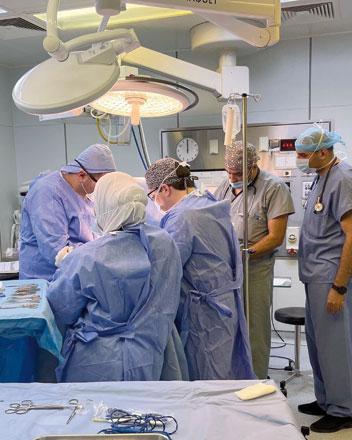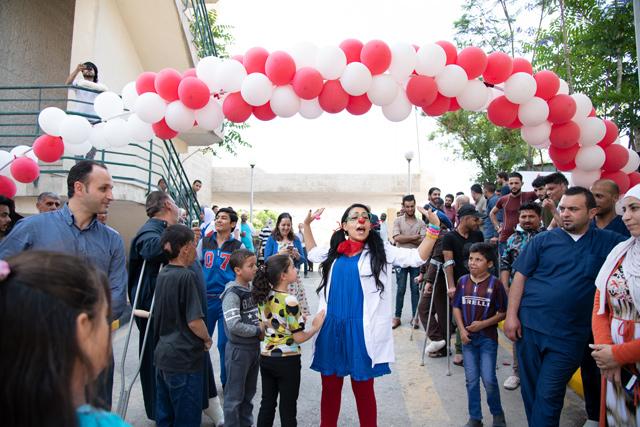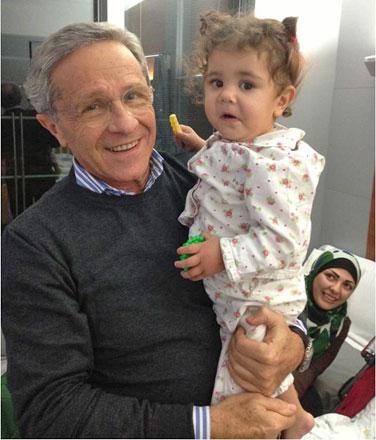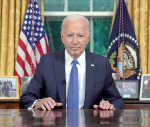You are here
Children victim of war given new chance at life through medical foundation
By Suzanna Goussous - Jul 03,2018 - Last updated at Jul 05,2018
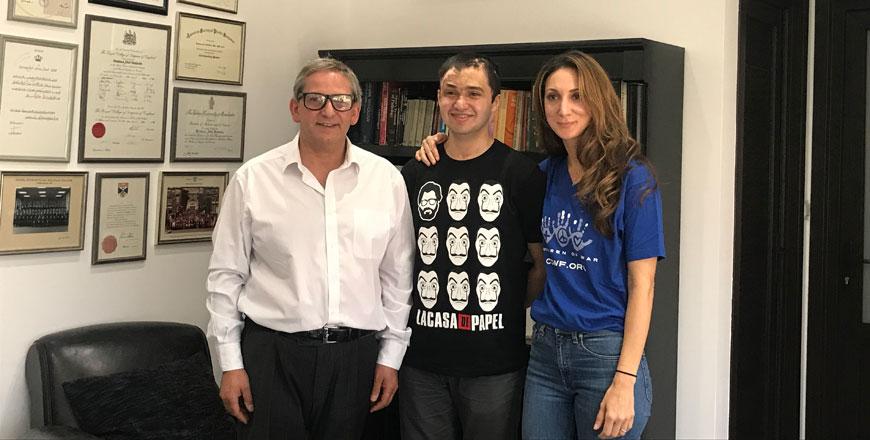
Hashem Hamzeh received medical treatment from the Children of War Foundation after he was victim of an explosion in Baghdad, Iraq (Photo courtesy of Children of War)
AMMAN — The life of Iraqi Hashem Hamzeh took a dramatic turn eight years ago, when he and his family were victims of a terrorist attack as they were driving through Baghdad.
At the time, Hashem was only ten years old, and he suffered the most dramatic consequences of the attack, his mother Zahraa Yahya remembered, describing his five-month coma and the loss of half of his skull.
After several attempts to reconstruct his skull and treat the young boy in Iraq, Hashem was given a life changing opportunity from Jordanian American Amel Najjar, the founder and executive director of the Children of War Foundation.
“I received a phone call from my husband, a pediatric plastic and reconstructive surgeon in Los Angeles, who told me about a boy in Iraq who needed help. He said 'he needs surgery or he won’t survive.' But the problem was that he couldn’t get out of Iraq,” she recounted.
“Because I am from Jordan, he asked if we could get him to the Kingdom so I reached out to my friends and family and we secured Hashem and his mother a visa to come to Jordan. From there, we got a visa to Los Angeles through the American embassy,” Najjar told The Jordan Times.
In August 2010, the foundation sent its first patient, accompanied by his mother, to the United States, where he received the initial treatment. Through four operations, a titanium plate was inserted into Hashem's missing part of the skull and he underwent physical rehabilitation for 11 months in Los Angeles.
His case drew the attention of the media and families of children in need of treatment alike, which prompted Najjar to travel back to Jordan two years later and partner with the Royal Medical Services to start a medical mission for similar cases.
In four days, the team operated on 58 children from Jordan, Palestine, Iraq and Syria, who suffered from various medical conditions.
Afterwards, the foundation headed to earthquake torn Haiti, where it opened a clinic, Najjar said, noting that last year, the foundation helped over 600 children there.
“About 90 per cent of the cases we treat are the ones that would have never been done because of the severity and complexity of the cases,” Najjar highlighted.
She said her focus now is to build a bigger team in Jordan, where she wants to establish a physical space for NGOs, academic centres and institutions to work hand-in-hand in order to teach and learn from each other.
“The NGO network here is fragmented and nobody wants to work together," the foundation founder claimed, stressing "if we didn’t have those barriers and if it wasn’t so fragmented, we would be able to reach out to more people by unifying our goals. I want to bring that change forward”.
Najjar stressed the need to focus on the mental and physical states affecting children, as new emerging medical needs arise due to the regional conflicts, noting that the region counts around 7 million refugees traumatised by the war and the damages done to their home countries.
Eight years after the attack, Hashem still visits Amman to continue his medical treatment. For Khaldoun Haddadin, consultant plastic reconstructive surgeon and president of the Jordanian Society of Plastic and Reconstructive Surgery, his case still requires a lot of time and efforts as he is scheduled to perform further surgical procedures on the young man.
"Hashem requires further completion of his surgical work-up and the medical team here in Amman plans to continue the surgical rehabilitation, including the scars on his head that prevents hair growth," Haddadin told The Jordan Times, noting "this requires excision over two stages. The first which will be done using a tissue expander to expand the part of his head that already has hair on it".
The treatment period in Amman will take around six weeks, which should allow him to regain a normal life.
“At first, they told me he was going to be uninvolved in the world, not an active member in society. But I was determined to give him everything he needed, the education he deserves, to teach him how to hold a pen… He is now in school, in his senior year, and is thinking of pursuing law studies when he graduates,” Hashem's mother rejoiced, adding that "he wants to help people and give them the rights he was forbidden of as a child living in a warzone”.
“He is back in Iraq as an adult and he now wants to give back and do good things because good things were done to him when he was younger. Children learn hate and fear, if you show them love and compassion, that is a reflection of who they will be when they are adults,” she stressed.
Najjar said: “With all the investments being made right now, the biggest investment would be the children, because they are the future, they are imitations of who we are today, just like Hashem, who had the opportunity to go to another country — his life was saved and now he went to Iraq and was able to thrive.”
The foundation can be contacted at: +1 310-926-2693, or via their Facebook page: Children of War Foundation or their website: http://Cowf.org/.
Related Articles
AMMAN — On July 17, a team of volunteer surgeons from the US arrived in the Kingdom as part of a mission lead by the Children of War Foundat
MARKA — Victims of regional conflicts have been Medecins Sans Frontieres (MSF) Amman Reconstructive Surgery Hospital, where teams of surgeon
AMMAN — When he was invited to a work trip to East Jerusalem to treat Palestinian children in 1999, Italian cardio-surgeon Giancarlo Crupi f


